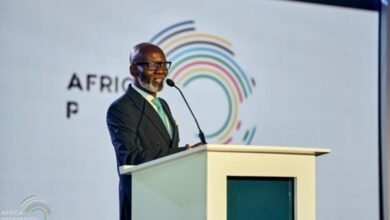Morocco : moroccan startups confirm their appetite for the African market
Morocco is keen to consolidate its position as Africa's technology leader. Therefore, it's no coincidence that the first African edition of the international tech mecca, GITEX was held in Marrakech from May 31 to June 2, 2023. But what is Morocco's tech ecosystem? Here's an overview.

By Merieme Alaoui , at Marrakech
The event brought together over 900 exhibitors, startups and delegations from 95 countries. With GITEX Africa Morocco, the entire program and ambition of the Kingdom is summed up in the name. « GITEX Africa showcases the technological potential of the continent and mobilizes African companies to rise to the top through technology. In these times of economic disruption and profound global change, the rise of digital technology is inevitable. Digital technology has become an essential lever for economic development, » Moroccan Prime Minister Aziz Akhannouch said at the opening ceremony. Organized by the Dubai World Trade Center (DWTC), under the aegis of the Ministry of Digital Transition and Administrative Reform (MTNRA), in partnership with the Digital Development Agency (ADD), GITEX will now be held annually and systematically in Morocco.
Morocco believes in young Africans excelling in digital and modern technologies like AI, cloud and cybersecurity
« Morocco is a natural choice to host GITEX in Africa. We believe in young African excelling in digital and modern technologies such as AI, cloud and cybersecurity. We are working with the Ministry of Higher Education and the various training centers to strengthen training and disciplines to increase the strength, energy and potential of these young people. In Morocco, young people are our main asset, » said Ghita Mezzour, Minister of Digital Transition and Administrative Reform.
Morocco is undoubtedly thinking big. And it is giving itself the resources to match its ambitions. But what about the country’s tech ecosystem? Where do Moroccan start-ups stand?
The kingdom has launched several initiatives. Starting with MoroccoTech, the national brand promoting Morocco’s digital sector. The result of a public-private partnership, it is a mobilizing and unifying movement that brings together the various players in the Moroccan digital ecosystem. These include the Ministry of Digital Transition and Administrative Reform, the Information Technologies, Telecommunications and Offshoring Federation, the Moroccan Agency for Investment and Export Development (AMDIE), the Agency for Digital Development (ADD), the General Confederation of Moroccan Enterprises (CGEM), the Association of Information Systems Users in Morocco (AUSIM) and the Casablanca Technopark).
The Moroccan authorities aim to increase the contribution of the ICT sector from the current 3% to 11% of GDP and to create 125,000 new jobs
The stated ambition is « to increase the weight of digital technology in the national economy and to establish Morocco as a regional hub ». The Moroccan authorities have announced that they aim to increase the contribution of the ICT sector from the current 3% to 11% of GDP, and create 125,000 new jobs. This is to compete with Tunisia (where the digital sector contributes over 4% of GDP, thanks to the implementation of the Startup Act) and Egypt (over 8% of GDP, with startups among the continental leaders).
Around a hundred Moroccan startups took to the GITEX aisles to showcase their home-grown technology. Distinguished by a « Morocco 100 » logo, they were chosen « based on objective criteria » to represent the Kingdom at the show. « We put out a call for applications and selected around a hundred startups, and we financed 95% of their attendance », said Mehdi El Alaoui, head of the startup ecosystem department at ADD.
« It’s a great opportunity for us to meet so many people, from Moroccan and African startups to investors, » said Aassem Diyane, co-CEO of healthcare startup Tinkiet, which offers a smart medicine cabinet for hospitals and clinics.
The Moroccan market for XDR solutions is expected to be worth more than $2 billion by 2025, and 50% of businesses will be using them to respond to threats
Morocco wants to stand out with its innovations. The Kingdom is counting on Deep Tech Guardome (MPS Group), a startup specializing in cybersecurity, to present a range of innovative technologies with its XDR (Extended Detection & Response) solution. The AI-based solution enables companies to detect and respond to cybersecurity threats. According to the group, the market for XDR solutions will be worth more than $2 billion by 2025, and 50% of companies will use them to respond to threats. AI is one of the key technologies the kingdom is looking to develop.
Startup Chari, which has confirmed that it has raised €1 million in funding from Orange (GITEX Diamond Sponsor), has also announced a partnership with the Mohamed VI Polytechnic University (UM6P) in Ben Guérir, near Marrakech. Chari, a major player in e-commerce in French-speaking Africa, will be hosted in the UM6P data center. The aim is to guarantee secure hosting, data availability and confidentiality, while complying with applicable protection standards. A fine showcase for Morocco, but one that comes after a long process. Especially in Africa.
In 2021, Moroccan start-ups raised a record DH269 million, according to Techcabal. An encouraging figure, but well behind the $100 million raised in Egypt, according to the same source.
« It is important to exchange ideas and new business opportunities in Africa. The continent has the human capacity and potential to facilitate inclusion and eradicate poverty in the region, » says Mehdi El Alaoui. He cites the continent’s natural resources, the world’s youngest population and its 500,000 developers as its main assets.
The African system is still immature. Donations and bank financing are not adapted to the business model of startups. Hence the use of crowdfunding
But while ambitions are undiminished, the global economic situation is not the most favorable. « Our African system is not yet mature. We’re still using traditional systems or methods of funding, such as donations or bank financing, which are not really suited to the business model of startups. In the near future, I think we’ll move more towards crowdfunding and impact investing. In other words, we’ll invest according to the impact the startup will have on its social footprint, » says Mehdi El Alaoui.
Aware of these difficulties, Morocco is defending the programs of its government agencies, led by the Ministry of Digital Transformation, which is in charge of economic development.
« With the startups selected by the Morocco100 program at GITEX, we are working on matchmaking, bringing together investors and venture capitalists with Moroccan startups. We will soon be organizing a regional hackathon, which we hope will be repeated in other regions of Morocco, » adds the head of the ADD.






